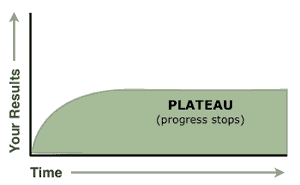How many times do we find ourselves doing the same things and not getting any better? The common term used for this is Plateauing.
Say exercise. You start with great enthusiasm and start getting some amazing results. But then over the course of time your settle for a narrow range of performance.

I have experienced this in stock market investment, practicing yoga, running, and name any field.
So, how can one avoid this plateau phase?
For this, it is good to understand why we hit this plateau phase.
To achieve performance in anything, the essential trait required is curiosity. This curiosity is what helps us propel at the beginning. But then as we become familiar, our mind starts taking things for granted.
Curiosity requires our neo-cortex to be active. Whenever the neo-cortex is active means, there is a lot more energy consumed. There are no repetitive tasks here.
But then there is a natural inclination for our brain to conserve energy and the way it does is to find repetitive tasks and make things repetitive. Avoid the neo-cortex trigger as much as possible.
We have all experienced that driving to a new place, finding the route, and navigating require us to spend more energy.
Whereas if we go to the same place a few times, the brain forms the neural pathways of the routes, and less energy is spent.
Similarly in other areas of life, as we gain experience we start using the same things that have worked and avoid being curious.
But then, how do some people are consistent in their performance? We have seen time and again in sportspersons, business leaders, and investors who beat all the odds and deliver performance consistently.
What is that secret being followed?
Practicing Beginners Mind
It is by practicing the beginner’s Mind!
As per Zen Buddhism, beginners mind practice means,
It doesn’t matter how many times you have done it, approach your every activity, just like a beginner. Drop all expectations and preconceived ideas, and approach with open mind.
For example, if practicing for a long-distance marathon, you do it with an open mind everyday practice like the first day.
It doesn’t matter if you missed yesterday, or you practiced for long hrs the previous day. The new day is a new start line.
Why is this so important?
Most problems being faced in business, or in general life turn out to be due to having preconceived ideas about that thing we want and expectations without having the full picture.
I remember many years back I got an opportunity to invest in a property in the upcoming north Bangalore. But just 6 months back my previous experience of investing in a similar property hadn’t gone well.
So as I gathered details, the little voice in me started saying if this investment also might fail.
Though this property developer and the earlier one had no relation, experience prevented me to proceed and I backed off. Today the value of the property has gone multifold higher.
Instead, if I had practiced the beginner’s mind, I could have started looking at everything as if it were brand new, perhaps with curiosity and using only the necessary experience of my past deal.
In most situations, instead of approaching as an expert or borrowing old experiences, practicing a beginner’s mind is a sure way to success.
Let’s take the example of meeting clients. It is common for anyone who is in business and sales.
The usual thing that happens when one starts is as a beginner there is a lot more curiosity to know what clients really want, keen to learn a side of the story.
But as time goes on, more meetings happen our brain starts looking for shortcuts, finding a pattern of what is happening, start forming ideas, and developing a sense of expertise.
In every meeting with prospects, there is an opportunity to explore the unique story behind the client’s situation. But if approached with preconceived ideas, a sense of familiarity, and an expert mindset, this will prevent one to uncover that story, that unique situation the client is in.
When this happens, the client conversations tend to follow a common routine and the seller fails to capture the uniqueness. As this happens, he won’t be able to develop new ideas or show a lot more energy which ultimately causes sales performance to go down.
Again if one takes a beginner’s mind approach, and is curious then the story gets uncovered which is behind every interaction.
This is the same for doctor-patient relations, teacher-student relations, investing, or any relationship where familiarity breeds contempt.
Adopting the beginner’s mind always gives one a chance to understand other people…
One area where I challenge myself on this is, in investing. Investing in the stock market can easily become boring. After a while, it is easier to fall in to trap of just looking at the company and checking a few numbers, reading some reports, and then investing some money.
It is lazy thinking!
But then, when I analyzed my best returns, I see that it has happened in those companies where I have practiced beginner’s mind.
That means being so curious and asking a lot of questions and exploring answers. It is making a genuine effort to understand,
What the business is really into?
Do they have that competitive advantage in the market?
Does the management really ethical?
Is there a demand in the market for products or services
Are the numbers reported really trustworthy?
Are the valuations provide a margin of safety?
Like this there 20-30 questions checklist to be followed to evaluate and find answers that can take days or months.
Like a beginner if we think, only one can uncover those.. else it becomes like one more stock investment and we resort to mental shortcuts that result in lower returns